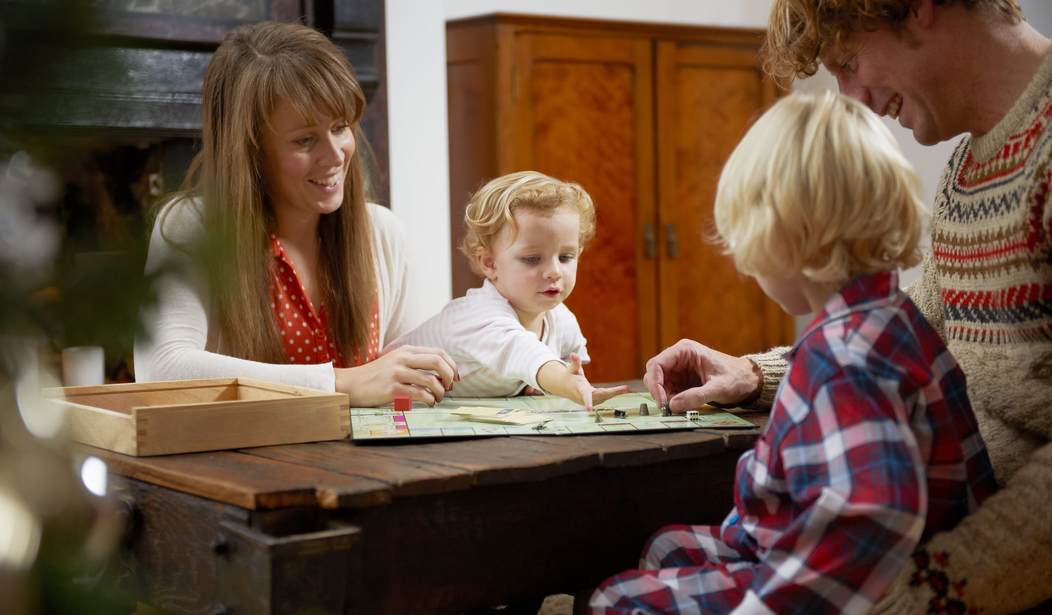There’s nothing worse than a sore loser. But in today’s “everybody wins” culture, it can be hard to know how to teach your child how to lose (or win) gracefully. But life is full of wins and losses, and learning how to handle them is an important part of becoming a productive member of society. Your two-year-old is primed and ready to learn this concept, and board games are a great way to teach him. Not sure your two-year-old is ready for board games? Here are a few of my favorite board games aimed at two- and three-year-olds.
First Orchard
This is a very simple, cooperative game that introduces the idea of winning and losing without pitting you and your child against each other. You all win, or you all lose. It’s a great introduction to the concept. The game comes with enticing, large (read: not choking hazards) wooden fruit which is placed on “trees” (cardboard discs) according to color. The goal is to “pick” all the fruit from the trees before a bird comes into the orchard and eats it all up. Collect all the fruit before the bird reaches the end of the path and you all win. If not, you lose. It’s a great opportunity to model how to act and what to say when you win, or when you lose. “Oh darn, we lost!” you could say. “Good game. Better luck next time.” Or, “Yay! We won! Good game!”
Hi Ho Cherry-O!
This game has been around for a long time, but it’s been revamped with brighter colors and a collaborative game play option. It’s a perfect game to try once you’ve mastered First Orchard because, unless you choose the collaborative version, this time you’re playing against your opponent. You’re each trying to be the first to pick ten fruits off your tree. A spinner tells you how many fruits you can pick and put in your basket, but it might also cause you to have to put two (or even all!) of them back. Because the game is basically luck of the draw (or spin), you don’t have to worry about whether or not to let your kid win. Just play the game. He’ll win some, he’ll lose some. Just like life. Remember that he’s learning from you. So be purposeful about your response when you win, or when you lose. Make sure you tell him “Good game!” at the end, no matter who won. And be gracious if you lose. (Just a word to the wise: this game has small pieces so, if your little one is still putting things in his mouth, maybe hold off on this one for a while longer.)
Uno Moo!
This is a fun variation on Uno, which incorporates animal figurines and a barn to keep kids engaged. The animal types (pig, cow, sheep, etc.) act as the numbers, and the color of each figurine acts as the colors. It’s a great next step, as it incorporates some very basic strategizing but still has enough of an element of chance that you don’t have to worry about orchestrating things so your child wins. Talk about your thought process as you play this game so that your kid can begin to get the idea of strategy. “Hmm, I have a red piece so I won’t play my wild yet. I’ll save it for when I don’t have anything else to play.”
Go Fish
Okay, not technically a board game, but fun nonetheless and another great way to practice winning and losing. For a variety of reasons, it makes sense to play this game with each person’s cards face up on the table. That way, you can help your child find matches if he’s struggling (though no need to pretend that you don’t have matches if you actually do). And also, his little hands aren’t going to be able to hold a hand of cards. It does make the whole asking for a card scenario kind of silly, because everyone knows whether you have that card or not. But your two-year-old won’t care. And he’ll really enjoy telling you to “Go fish!” Keep up that running commentary and don’t forget to tell each other “Good game!”
***
Whether you like it or not, winning and losing is a part of life. And teaching your child to be a good loser, and a gracious winner is a gift he’ll carry with him always. Not to mention that playing board games is endless fun. May the best man (or kid) win!













Join the conversation as a VIP Member